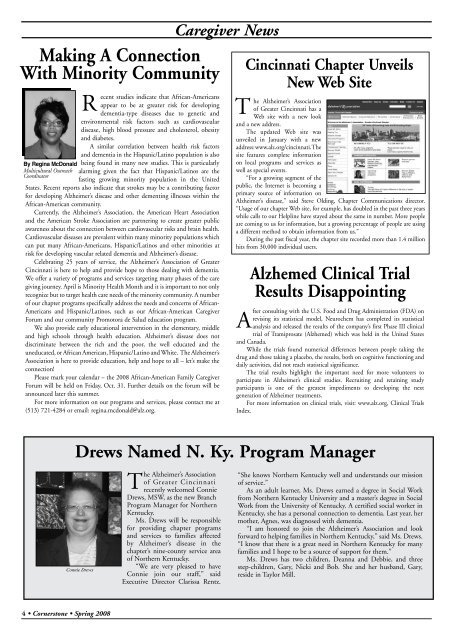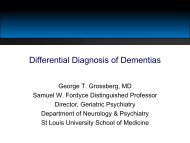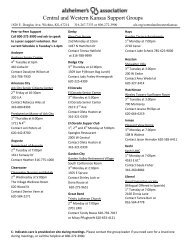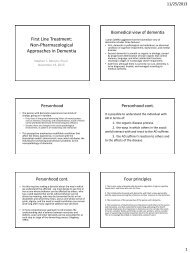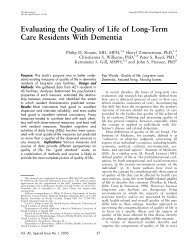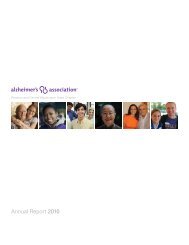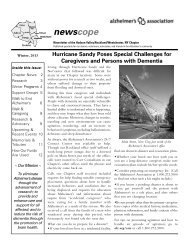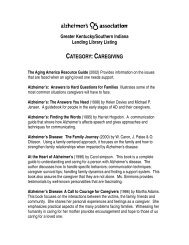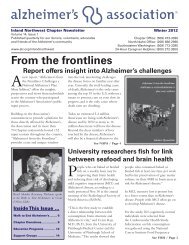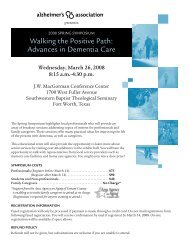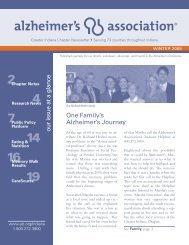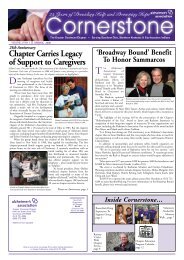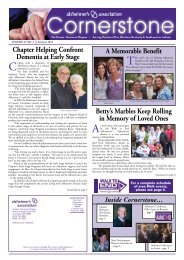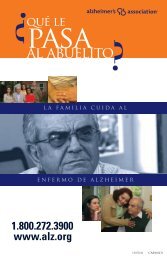Chapter Carries Legacy of Support to Caregivers - Alzheimer's ...
Chapter Carries Legacy of Support to Caregivers - Alzheimer's ...
Chapter Carries Legacy of Support to Caregivers - Alzheimer's ...
You also want an ePaper? Increase the reach of your titles
YUMPU automatically turns print PDFs into web optimized ePapers that Google loves.
Making A Connection<br />
With Minority Community<br />
By Regina McDonald<br />
Multicultural Outreach<br />
Coordina<strong>to</strong>r<br />
R<br />
4 • Corners<strong>to</strong>ne • Spring 2008<br />
ecent studies indicate that African-Americans<br />
appear <strong>to</strong> be at greater risk for developing<br />
dementia-type diseases due <strong>to</strong> genetic and<br />
environmental risk fac<strong>to</strong>rs such as cardiovascular<br />
disease, high blood pressure and cholesterol, obesity<br />
and diabetes.<br />
A similar correlation between health risk fac<strong>to</strong>rs<br />
and dementia in the Hispanic/Latino population is also<br />
being found in many new studies. This is particularly<br />
alarming given the fact that Hispanic/Latinos are the<br />
fasting growing minority population in the United<br />
States. Recent reports also indicate that strokes may be a contributing fac<strong>to</strong>r<br />
for developing Alzheimer’s disease and other dementing illnesses within the<br />
African-American community.<br />
Currently, the Alzheimer’s Association, the American Heart Association<br />
and the American Stroke Association are partnering <strong>to</strong> create greater public<br />
awareness about the connection between cardiovascular risks and brain health.<br />
Cardiovascular diseases are prevalent within many minority populations which<br />
can put many African-Americans, Hispanic/Latinos and other minorities at<br />
risk for developing vascular related dementia and Alzheimer’s disease.<br />
Celebrating 25 years <strong>of</strong> service, the Alzheimer’s Association <strong>of</strong> Greater<br />
Cincinnati is here <strong>to</strong> help and provide hope <strong>to</strong> those dealing with dementia.<br />
We <strong>of</strong>fer a variety <strong>of</strong> programs and services targeting many phases <strong>of</strong> the care<br />
giving journey. April is Minority Health Month and it is important <strong>to</strong> not only<br />
recognize but <strong>to</strong> target health care needs <strong>of</strong> the minority community. A number<br />
<strong>of</strong> our chapter programs specifically address the needs and concerns <strong>of</strong> African-<br />
Americans and Hispanic/Latinos, such as our African-American Caregiver<br />
Forum and our community Promo<strong>to</strong>ra de Salud education program.<br />
We also provide early educational intervention in the elementary, middle<br />
and high schools through health education. Alzheimer’s disease does not<br />
discriminate between the rich and the poor, the well educated and the<br />
uneducated, or African American, Hispanic/Latino and White. The Alzheimer’s<br />
Association is here <strong>to</strong> provide education, help and hope <strong>to</strong> all – let’s make the<br />
connection!<br />
Please mark your calendar – the 2008 African-American Family Caregiver<br />
Forum will be held on Friday, Oct. 31. Further details on the forum will be<br />
announced later this summer.<br />
For more information on our programs and services, please contact me at<br />
(513) 721-4284 or email: regina.mcdonald@alz.org.<br />
he Alzheimer’s Association<br />
<strong>of</strong> Greater Cincinnati<br />
recently welcomed Connie<br />
Drews, MSW, as the new Branch<br />
Program Manager for Northern<br />
Kentucky.<br />
Ms. Drews will be responsible<br />
for providing chapter programs<br />
and services <strong>to</strong> families affected<br />
by Alzheimer’s disease in the<br />
chapter’s nine-county service area<br />
<strong>of</strong> Northern Kentucky.<br />
“We are very pleased <strong>to</strong> have<br />
Connie join our staff,” said<br />
Executive Direc<strong>to</strong>r Clarissa Rentz.<br />
Caregiver News<br />
Drews Named N. Ky. Program Manager<br />
Connie Drews<br />
T<br />
T<br />
Cincinnati <strong>Chapter</strong> Unveils<br />
New Web Site<br />
he Alzheimer’s Association<br />
<strong>of</strong> Greater Cincinnati has a<br />
Web site with a new look<br />
and a new address.<br />
The updated Web site was<br />
unveiled in January with a new<br />
address: www.alz.org/cincinnati. The<br />
site features complete information<br />
on local programs and services as<br />
well as special events.<br />
“For a growing segment <strong>of</strong> the<br />
public, the Internet is becoming a<br />
primary source <strong>of</strong> information on<br />
Alzheimer’s disease,” said Steve Olding, <strong>Chapter</strong> Communications direc<strong>to</strong>r.<br />
“Usage <strong>of</strong> our chapter Web site, for example, has doubled in the past three years<br />
while calls <strong>to</strong> our Helpline have stayed about the same in number. More people<br />
are coming <strong>to</strong> us for information, but a growing percentage <strong>of</strong> people are using<br />
a different method <strong>to</strong> obtain information from us.”<br />
During the past fiscal year, the chapter site recorded more than 1.4 million<br />
hits from 30,000 individual users.<br />
A<br />
Alzhemed Clinical Trial<br />
Results Disappointing<br />
fter consulting with the U.S. Food and Drug Administration (FDA) on<br />
revising its statistical model, Neurochem has completed its statistical<br />
analysis and released the results <strong>of</strong> the company’s first Phase III clinical<br />
trial <strong>of</strong> Tramiprosate (Alzhemed) which was held in the United States<br />
and Canada.<br />
While the trials found numerical differences between people taking the<br />
drug and those taking a placebo, the results, both on cognitive functioning and<br />
daily activities, did not reach statistical significance.<br />
The trial results highlight the important need for more volunteers <strong>to</strong><br />
participate in Alzheimer’s clinical studies. Recruiting and retaining study<br />
participants is one <strong>of</strong> the greatest impediments <strong>to</strong> developing the next<br />
generation <strong>of</strong> Alzheimer treatments.<br />
For more information on clinical trials, visit: www.alz.org, Clinical Trials<br />
Index.<br />
“She knows Northern Kentucky well and understands our mission<br />
<strong>of</strong> service.”<br />
As an adult learner, Ms. Drews earned a degree in Social Work<br />
from Northern Kentucky University and a master’s degree in Social<br />
Work from the University <strong>of</strong> Kentucky. A certified social worker in<br />
Kentucky, she has a personal connection <strong>to</strong> dementia. Last year, her<br />
mother, Agnes, was diagnosed with dementia.<br />
“I am honored <strong>to</strong> join the Alzheimer’s Association and look<br />
forward <strong>to</strong> helping families in Northern Kentucky,” said Ms. Drews.<br />
“I know that there is a great need in Northern Kentucky for many<br />
families and I hope <strong>to</strong> be a source <strong>of</strong> support for them.”<br />
Ms. Drews has two children, Deanna and Debbie, and three<br />
step-children, Gary, Nicki and Bob. She and her husband, Gary,<br />
reside in Taylor Mill.


